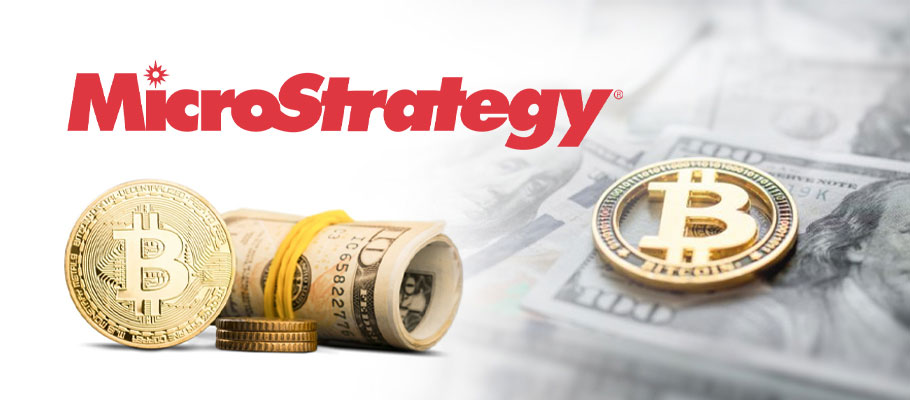
Published: September 27th, 2023
The world’s number one corporate holder of Bitcoin announced a new acquisition of the market’s largest cryptocurrency this week. MicroStrategy made an SEC filing on Monday stating the firm and its subsidiaries had bought approximately 5,445 Bitcoin in early August.
The total cash value was listed at USD 147.2 million. At the time, Bitcoin was trading hands at approximately USD 27,051 per coin.
With its most recent purchase, MicroStrategy has stuffed its vault to roughly 158,245 BTC. Analysis by CoinGecko puts the average purchase price at circa USD 29,580. Using figures provided in the filing, the aggregate purchase price paid by MicroStrategy for its BTC holdings to be USD 4.67 billion.
While the company’s continuing accumulation of Bitcoin supports its public pronouncements in support of the asset, calling it both a store of value and an appreciable long-term asset, the ongoing chill affecting crypto markets currently also pushes its BTC balance sheet notably into the red. That’s especially true of historical investments made when Bitcoin was riding high near the USD 60,000 mark.
As if on cue, Bitcoin was down 1.6 per cent on the day, trading just north of USD 26,090 at time of writing. That would value the total Bitcoin held by MicroStrategy at circa USD 4.1 billion.
In June of this year, the firm purchased 12,330 BTC for USD 346 million. The average purchase price for one coin at the time was USD 29,667.
MicroStrategy began its cryptocurrency acquisition in August of 2020, with co-founder and CEO Michael Saylor saying that the firm's main motivation was to hold BTC as an inflation hedge.
Earlier in 2022, Saylor said the company remains committed to its approach, which is to keep buying and holding Bitcoin over the long term.
‘What’s important for us is to be transparent, responsible and consistent.’
Saylor and MicroStrategy have often been at the forefront of BTC adoption, paving the way for risk-averse corporates and institutions to extend their Bitcoin exposure.
When forex traders went bear-ish on BTC in March 2020, a major corporate buy from MicroStrategy played a huge part in returning liquidity to crypto markets. It kicked off a slow but steady appreciation that accelerated in 2021, sending BTC's above USD 60,000.
When Elon Musk purchased Twitter in April of 2022, MicroStrategy CEO Michael Saylor offered Musk congratulations via Twitter, quoting the American Constitution’s first amendment, which guarantees that governments can't place limits on free speech.
Saylor’s very public show of support amid controversy about how Musk would run the social network helped drive up the price of DOGE (then rumoured to become a form of payment on Twitter) by 24 per cent.
Traditional finance has definitely needed to be won over. As recently as January of 2022, analysts at Wall Street stalwart JP Morgan published a report saying Bitcoin would struggle to win over new institutional investors due to its volatility.
In a note to investors, Morgan analysts said they saw 'notable challenges' in the coming months for crypto’s biggest coin.
Bitcoin's volatility made it five times more prone to price swings than gold, and the raft of competitors lining up to take a chunk out of Ethereum's market share means its steady rise could be halted or even reversed.
On a more positive note, the market missive also said that the current crypto price slide looked to be 'less dire than the plunge seen in May 2021,' when prices crashed the combined crypto market cap by billions in a single week.
'It's our view that Bitcoin's most significant challenge going forward is its inherent volatility and the cycles of boom & bust cycles that make extended institutional adoption less likely.
The note said that BTC, which was down 43 per cent from an all-time high of USD 69,000 reached in November 2021, was also more volatile than gold by a factor of five. That belies the claims of many cryptocurrency commentators who frequently refer to BTC as 'digital gold,' offering hedge protection against inflation similar to what the yellow metal has traditionally provided to investors.
Two reports released in September of 2021 captured a steady rise in the level of interest crypto had garnered from traditional investors.
A survey by Nickel Digital Asset Management in London found that more than 80 per cent of wealth managers, institutions, and hedge fund executives with current crypto exposure planned to grow their digital asset holdings in 2022.
Forty per cent indicated plans to increase their crypto positions, and only eight per cent said they planned to walk back their digital asset investments.
The majority, however, had relatively low levels of crypto-asset exposure, indicating some were testing to market or attempting to learn how it operates.
More than half said they were looking at crypto assets as a source of long-term capital growth. Nearly 40 per cent said that the practical experience of trading crypto strengthened their confidence in the asset class. Another 35 per cent said steady encouragement from other investors and fund managers spurred them to invest further.
In a summary report, Nickel said that broad market confidence in the cryptocurrency asset class is rising.
‘Our research points at least 19 publicly traded companies worth a combined USD one trillion have invested nearly 6.5 billion dollars in BTC alone.’
Data from JP Morgan's own research found that even traditional investment firms with no experience in cryptocurrencies were expected to hold crypto on their books in 2022.
A survey of more than 3,500 investors found that just ten per cent of those polled worked for firms that invested or traded in digital assets. However, more than double that proportion indicated readiness to invest in Bitcoin and potentially others, suggesting that old money was set to keep flowing into crypto markets.